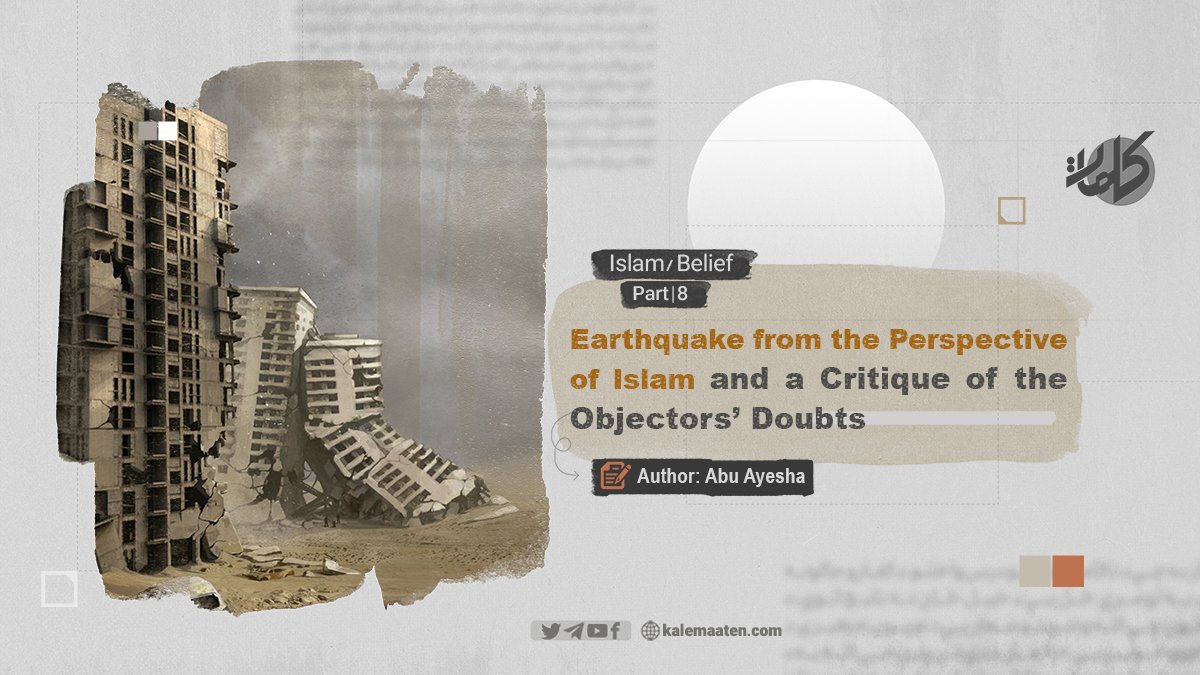Author: Abu Ayesha
Earthquake from the Perspective of Islam and a Critique of the Objectors’ Doubts (Part 8)
Preface:
Disastrous events, devastating calamities, and unbearable destructions that occur beyond human capacity leave mankind astonished and deeply concerned. They occupy human thought and reflection, driving people to seek and investigate the causes behind such phenomena. Scientists believe that the universe operates as an integrated, harmonious, and orderly system, and they consider such occurrences as forms of disturbance arising from certain causes and internal factors within the earth — such as heat and tectonic activity.
However, it is evident to those who believe in the unseen world and in Allah the Almighty — those who know that Allah possesses both anger and pleasure and expresses them in any manner He wills — that His pleasure and displeasure are tied solely to the deeds of His servants.
In this section of the study, we will address some of the common doubts and objections raised by critics and skeptics.
Among the most frequently asked questions in the public mind are these:
Is an earthquake a divine punishment sent to awaken the community from its heedlessness? Or is it, like rain, snow, and wind, a blessing from Allah? If earthquakes are a form of divine punishment, then why do Muslims — even innocent children — suffer from them? Why does this punishment not strike only those who deserve it, such as the disobedient and the disbelievers? Are earthquakes purely natural events without cause, or do they have divine and spiritual wisdom behind them as well?
In Islam, earthquakes and other calamities are not always signs of punishment. Rather, they may serve different purposes:
– For the disbelievers, they are punishment and warning;
– For the believers, they are tests and means of raising rank;
– And for the sinners among the believers, they are atonement for sins.
This concept has already been explained earlier in the light of the sayings of the noble scholars.
Allamah Dr. Yusuf al-Qaradawi (MABH) said in one of his lectures regarding events such as earthquakes and volcanoes: “Earthquakes, volcanoes, and other calamities that befall people are punishments from Allah the Exalted for the destruction and downfall of the arrogant and the transgressors. They are discipline and correction for the sinful and the corrupt, reminders for the heedless and forgetful, and tests for the believers.” (1)
If we examine these events through the lens of the noble Qur’an and the stories of the past, we find meaningful lessons and profound wisdom, and we know that Allah the Exalted has beautifully guided His servants toward understanding the purpose behind such occurrences.
Allah the Almighty says concerning the testing of His servants: “وَلَنَبْلُوَنَّكُم بِشَيْءٍ مِّنَ الْخَوْفِ وَالْجُوعِ وَنَقْصٍ مِّنَ الْأَمْوَالِ وَالْأَنفُسِ وَالثَّمَرَاتِۗ وَبَشِّرِ الصَّابِرِينَ”(2) Translation: “Indeed, We shall test you with something of fear and hunger and a loss of wealth, lives, and fruits; but give glad tidings to those who are patient.”
Sometimes, Allah the Exalted sends afflictions and hardships to cultivate, refine, and strengthen moral virtues within humankind, so that hidden potentials may emerge, and individuals may learn endurance, steadfastness, and spiritual awakening in the face of trials — a wake-up call for those lost in heedlessness.
Allah the Almighty says: “وَلَقَدْ أَخَذْنَا آلَ فِرْعَوْنَ بِالسِّنِينَ وَنَقْصٍ مِّنَ الثَّمَرَاتِ لَعَلَّهُمْ يَذَّكَّرُونَ”(3) Translation: “And indeed, we afflicted the people of Pharaoh with years of drought and a shortage of fruits, that they might take heed and remember.”
Therefore, according to the verses of the noble Qur’an, calamities, afflictions, and earthquakes occur for several reasons, among which are the following:
Sin — the Root Cause of All Calamities
In several verses of the Noble Qur’an, it is explicitly affirmed that destiny governs all affairs, and that no event occurs in the universe except by the will and decree of Allah. Every occurrence has already been recorded in a divine register before it takes place. As Allah the Exalted says: “مَا أَصَابَ مِن مُّصِيبَةٍ فِي ٱلْأَرْضِ وَلَا فِيٓ أَنفُسِكُمْ إِلَّا فِي كِتَٰبٍ مِّن قَبْلِ أَن نَّبْرَأَهَآۚ إِنَّ ذَٰلِكَ عَلَى ٱللَّهِ يَسِيرٌ”(4) Translation: “No calamity befalls on the earth or among yourselves except that it is inscribed in a record before We bring it into being. Indeed, that is easy for Allah.”
In another verse, the Lord of the Worlds says: “وَمَا أَصَابَكُم مِّن مُّصِيبَةٍ فَبِمَا كَسَبَتْ أَيْدِيكُمْ” (5) Translation: “Whatever calamity befalls you is because of what your own hands have earned.”
And in another verse, He says: “مَا أَصَابَكَ مِنْ حَسَنَةٍ فَمِنَ اللَّهِ وَمَا أَصَابَكَ مِن سَيِّئَةٍ فَمِن نَّفْسِكَ”(6) Translation: “Whatever good befalls you is from Allah, and whatever evil befalls you is from yourself.”
Allah the Almighty also says: “وَمَا كَانَ اللَّهُ لِيَظْلِمَهُمْ وَلَٰكِن كَانُوا أَنفُسَهُمْ يَظْلِمُونَ”(7) Translation: “Allah is not one to wrong them, but they wronged themselves.”
And in another verse, He declares: “ظَهَرَ الْفَسَادُ فِي الْبَرِّ وَالْبَحْرِ بِمَا كَسَبَتْ أَيْدِي النَّاسِ”(8) Translation: “Corruption has appeared on land and sea because of what people’s own hands have earned.”
And the Lord of Might and Glory say elsewhere: “فَكَيْفَ إِذَا أَصَابَتْهُم مُّصِيبَةٌۢ بِمَا قَدَّمَتْ أَيْدِيهِمْ”(9) Translation: “What will happen when a calamity befalls them because of what their own hands have sent forth?”
In this verse, the phrase “بِمَا قَدَّمَتْ أَيْدِيهِمْ” refers to a person’s own deeds — actions that precede him and rise up to the heavenly realm, which then become the cause for the descent of affliction.
The term “مصیبة” (calamity) here carries a broad meaning — it includes every form of hardship, distress, and divine punishment that befalls a person as a result of his own wrongdoing.
To be continued…
Previous Part/ Next Part
References:
- Hammam Abdul-Ma‘boud, Title of the article: “Are Sins the Cause Behind Earthquakes?” website: Islam Online.
- Surah Al-Baqarah, verse 155.
- Surah Al-A‘raf, verse 130.
- Surah Al-Hadid, verse 22.
- Surah Ash-Shura, verse 30.
- Surah An-Nisa, verse 79.
- Surah Al-‘Ankabut, verse 40.
- Surah Ar-Rum, verse 41.
- Surah An-Nisa, verse 62.



